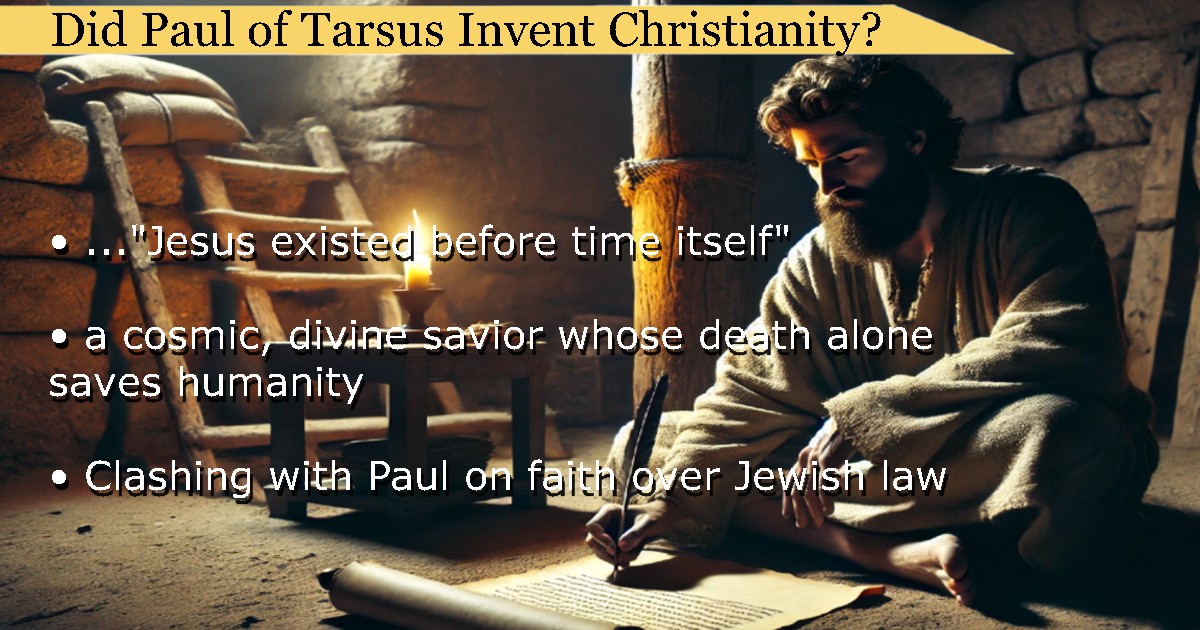What if the Christianity you know isn’t from Jesus, but from Paul?
Most Christians assume their faith is based on the teachings of Jesus, but what if the real architect of Christianity was Paul of Tarsus? Secular scholars argue that Paul transformed Jesus’ Jewish movement into something new—a religion focused on faith over Jewish law, salvation through Jesus’ death, and a cosmic Christ rather than an earthly teacher.
Let’s break down the historical evidence from the earliest Christian texts and non-canonical sources.
Paul’s Letters: The Earliest Christian Writings
The New Testament Gospels (Matthew, Mark, Luke, John) were written decades after Jesus’ death (Mark: ~70 AD, Matthew/Luke: ~80-90 AD, John: ~90-110 AD).
However, Paul’s letters (Epistles) were written first, around 50-60 AD—meaning his interpretation of Jesus’ message predates the Gospels.
Key Observations from Paul’s Writings:
Paul rarely quotes Jesus’ actual words.
Paul never refers to Jesus’ parables, Sermon on the Mount, or moral teachings. Instead, he focuses on Jesus’ death and resurrection as the center of the faith.
“For I resolved to know nothing while I was with you except Jesus Christ and him crucified.” (1 Corinthians 2:2)
Paul teaches salvation through faith alone.
Paul argues that salvation comes from faith in Christ’s death and resurrection—not from following the Jewish Law (Torah).
“For we maintain that a person is justified by faith apart from the works of the law.” (Romans 3:28)
This contradicts Jesus, who emphasized obedience to the Law:
“Do not think that I have come to abolish the Law or the Prophets; I have not come to abolish them but to fulfill them. Truly I tell you, until heaven and earth disappear, not the smallest letter, not the least stroke of a pen, will by any means disappear from the Law until everything is accomplished.” (Matthew 5:17-19)
Was Paul inventing a new religion by replacing Jewish law with faith alone?
Paul’s Conflict with Jesus’ Original Disciples
Paul openly clashed with Jesus’ direct disciples, especially Peter and James (Jesus’ brother).
Galatians 2:11-14 – Paul Opposes Peter
“When Cephas (Peter) came to Antioch, I opposed him to his face, because he stood condemned. Before certain men came from James, he used to eat with the Gentiles. But when they arrived, he began to draw back and separate himself for fear of those who belonged to the circumcision group.”
This passage shows:
- Peter and James (Jesus’ original disciples) still followed Jewish customs (e.g., circumcision, dietary laws).
- Paul rejects their views, arguing that Jesus’ followers should abandon Jewish law.
The Ebionites (Early Jewish Christians) Rejected Paul
The Ebionites were an early sect of Jewish-Christians who followed Jesus’ original Jewish teachings and viewed Paul as an imposter.
- Church Father Irenaeus (2nd century AD) writes:
“They (the Ebionites) use only the Gospel of Matthew and reject the Apostle Paul, calling him an apostate from the law.” (Against Heresies 1.26.2)
Why did the Ebionites reject Paul? Because Paul’s version of Jesus did not align with what Jesus’ own disciples taught.
The Gospels vs. Paul: Different Versions of Jesus
While Paul presents Jesus as a cosmic divine savior, the Synoptic Gospels (Matthew, Mark, and Luke) depict him as a Jewish teacher and prophet.
Jesus as a Jewish Prophet (Gospels)
- Jesus preaches about the Kingdom of God, not himself. “Repent, for the kingdom of heaven has come near.” (Matthew 4:17)
- Jesus keeps Jewish Law “If you want to enter life, keep the commandments.” (Matthew 19:17)
Jesus as a Cosmic Savior (Paul)
- Paul does not focus on Jesus’ earthly teachings, but on his death and resurrection as the key to salvation. “If Christ has not been raised, your faith is futile; you are still in your sins.” (1 Corinthians 15:17)
- Paul claims Jesus existed before time itself and is a divine being: “He is the image of the invisible God, the firstborn over all creation.” (Colossians 1:15)
This “cosmic Christ” idea is absent from Jesus’ teachings in Matthew, Mark, and Luke.
Non-Canonical Gospels Give an Alternate View of Jesus
Several non-canonical (rejected) Gospels suggest Jesus’ original message may have been different from Paul’s.
The Gospel of Thomas (Discovered in the Nag Hammadi Library)
This text contains Jesus’ sayings—but no crucifixion, no resurrection, no “faith alone” doctrine.
- Jesus focuses on wisdom, not atonement: “The kingdom of God is inside you and all around you. Split a piece of wood, and I am there.” (Gospel of Thomas, Logion 77)
The Gospel of Judas
This text presents Jesus revealing secret knowledge (Gnosis) to Judas, contradicting Paul’s message of simple faith.
- Jesus laughs at his disciples for misunderstanding his role: “You will exceed all of them. For you will sacrifice the man that clothes me.” (Gospel of Judas)
These Gospels suggest an early diversity of Christian thought, where not everyone agreed with Paul’s interpretation.
Did Paul Create Christianity?
The historical evidence suggests:
✔️ Jesus preached a Jewish renewal movement focused on ethics and the Kingdom of God.
✔️ Paul redefined Jesus as a cosmic, divine savior whose death alone saves humanity.
✔️ Jesus’ original disciples clashed with Paul over Jewish law.
✔️ Non-canonical Gospels show alternative versions of Jesus’ message.
So, did Paul create Christianity?
Without Paul, Christianity may have remained a Jewish sect rather than becoming the global religion we know today. Paul’s version of Jesus won—but was it the original?
Sources & Further Reading
Bart Ehrman, How Jesus Became God
Hyam Maccoby, The Mythmaker: Paul and the Invention of Christianity
Elaine Pagels, The Gnostic Gospels
James Tabor, Paul and Jesus: How the Apostle Transformed Christianity
The Gospel of Thomas, Gospel of Judas (Nag Hammadi Library)

